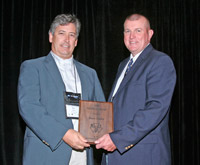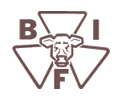Award Winners
Golden Honored with BIF Pioneer Award

[Photo by Cornerpost Publications, publisher of the California Cattleman.]
(click picture to enlarge)
A California native, Golden received his bachelor’s and master’s degrees in animal science from Washington State University, Pullman. In 1989, he received a doctorate in animal breeding and genetics from Colorado State University (CSU), Fort Collins, Colo.
Golden was a faculty member at CSU for 19 years before becoming the COO of OptiBrand®, a company he founded in 1998 with two colleagues from CSU who worked with him to develop a secure, biometric and humane method to identify and trace livestock.
Past students consider him an enthusiastic teacher and, over the years, he taught several undergraduate and graduate classes at CSU and Cal Poly. Throughout his career, he has worked with a large number of graduate students who have gone on to careers in academics, industry and government.
During his time on the CSU faculty, Golden established the Center for Genetic Evaluation of Livestock (CGEL), which today remains one of the premier national cattle evaluation research and development groups in the world. He produced one of the first multiple-trait national evaluations using the animal model for Red Angus in 1986. Since its inception, the CGEL has produced population-level genetic evaluations for dozens of beef breed associations and producer groups in North America, South America, New Zealand and Ireland.
One of Golden’s strengths is in computing; he is responsible for the original creation of the genetic evaluation software known as the Animal Breeder’s Tool Kit (ABTK). The ABTK is a suite of computing tools for conducting large-scale genetic analyses. After several updates and additions, the ABTK is still the core software used by the CGEL, as well as genetics researchers around the world.
His most significant programming contributions, include efficient algorithms for computation of the inverse relationship matrix from large pedigrees; approximation of the inverse coefficient matrix used to obtain prediction error variances and accuracy values; and biometric methods for animal identification. Golden was responsible for establishing the first Linux-based Beowulf cluster computing platform used for large-scale genetic prediction work in livestock at CSU.
During his research at CSU, he focused on trait development and expected progeny differences (EPDs) for novel traits, such as heifer pregnancy, stayability and maintenance energy. In order to foster discussion about animal genetics in an open forum, he founded the Animal Genetics Discussion Group (AGDG), an online network of animal breeders from throughout the world.
Golden is a longtime participant in and supporter of the BIF. He was honored by the BIF with a Continuing Service Award in 1999. He has served on the BIF Genetic Prediction Committee and wrote significant portions of the National Cattle Evaluation (NCE) methods chapter in the BIF Guidelines for Uniform Beef Improvement Programs.
His presentation on the next generation of EPDs under the economically relevant trait framework, during the 2000 BIF annual meetings in Wichita, Kan., remains a key reference and discussion point today. In 2008, he gave an invited paper on the history of national cattle evaluation development in the United States at the Federation of Animal Science Societies (FASS) annual meeting.
In addition to his pioneering work in genetic evaluation and improvement of beef cattle, Golden is an avid fly fisherman, guitarist, dog enthusiast and chef. He and his wife Mary live in San Luis Obispo, Calif.
Editor’s Note: This release is provided by the Beef Improvement Federation. The 41st BIF Research Symposium and Annual Meeting was hosted by the California Beef Cattle Improvement Association (CBCIA) and the California Cattlemen’s Association (CCA). For more information, contact Kelli Toledo at 559-972-8987 or visit www.calcattlemen.org/bif2009.html.



